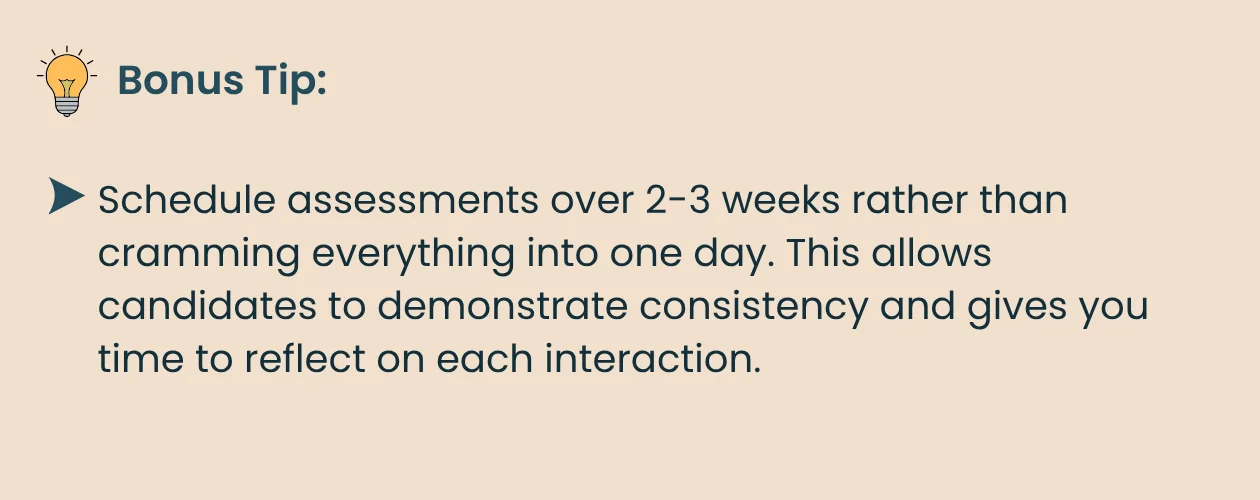TL;DR
- Executive assessment evaluates leadership potential beyond traditional interviews through psychometric tests, behavioural interviews, and other methods.
- It mitigates hiring risks, enhances decision-making, and ensures cultural alignment in senior-level recruitment.
- The process includes multi-method assessments such as case studies, 360-degree feedback, and AI-powered tools for comprehensive evaluation.
- Key benefits include improved hiring success, reduced turnover, enhanced organisational performance, and objective decision-making.
- Challenges involve cultural context, stakeholder perspectives, and the significant investment of time and resources required.
- Best practices recommend clear success criteria, combining assessment methods, skilled assessors, and maintaining a positive candidate experience.
- The future of executive assessment is shaped by AI, virtual reality, and holistic evaluation focused on leadership adaptability and ecosystem fit.
In today's competitive business landscape, selecting the right executive can make or break an organisation's future. Executive assessment has become the cornerstone of strategic talent acquisition, serving as a comprehensive evaluation process that goes far beyond traditional interviews and CV reviews. This systematic approach helps organisations identify leaders who possess not only the technical expertise but also the emotional intelligence and strategic acumen needed to drive success.
With the recruitment software market valued at US$3.30 billion in 2025 and organisations increasingly recognising the critical importance of leadership selection, executive assessment has evolved into a sophisticated discipline. Modern assessment techniques combine data-driven insights with proven psychological principles to create a holistic picture of a candidate's leadership potential, making it an indispensable tool for companies seeking to secure their competitive advantage through exceptional leadership.
What Is Executive Assessment?
Executive assessment is a comprehensive evaluation process designed to measure an individual's leadership capabilities, potential, and fit for senior-level positions within an organisation. This systematic approach examines candidates across multiple dimensions, including cognitive abilities, personality traits, leadership competencies, and cultural alignment.
The process typically involves a combination of psychometric testing, behavioural interviews, case studies, and 360-degree feedback mechanisms. Unlike standard recruitment practices, executive assessment delves deeper into a candidate's decision-making style, strategic thinking abilities, and capacity to lead teams through complex challenges.
At its core, executive assessment serves as a risk mitigation strategy for organisations making high-stakes hiring decisions. Given that executive-level hires can cost three to four times the employee's salary, the investment in thorough assessment becomes not just prudent but essential for organisational success.
Why Is Executive Assessment Critical for Modern Organisations?
1. Strategic Risk Management
Executive assessment plays a pivotal role in reducing the substantial costs associated with poor leadership hires. When senior appointments fail, organisations face not only direct financial losses but also potential damage to company culture, stakeholder confidence, and market position.
2. Enhanced Decision-Making Quality
The multi-faceted nature of executive assessment provides hiring committees with comprehensive data to support their decisions. This evidence-based approach significantly improves the quality of leadership selections compared to traditional interview-only processes.
3. Cultural Alignment and Integration
Modern executive assessment tools evaluate how well candidates align with organisational values and culture. This cultural fit assessment is particularly crucial for senior roles where leaders must champion company values and drive cultural transformation initiatives.
4. Succession Planning and Development
Executive assessment isn't limited to external recruitment; it's equally valuable for internal succession planning. By regularly assessing high-potential employees, organisations can identify future leaders and create targeted development programmes to prepare them for senior roles.
How Does the Executive Assessment Process Work?
1. Initial Screening and Profiling
The executive assessment process begins with a thorough analysis of the role requirements and organisational context. This involves creating detailed competency profiles that outline the specific skills, experiences, and attributes needed for success in the position.
Professional assessors work closely with hiring managers to understand the strategic challenges the new executive will face, ensuring the assessment methodology aligns with these requirements. This preliminary phase also includes reviewing candidate applications and conducting initial screenings to identify those who meet basic qualifications.
2. Multi-Method Assessment Approach
The actual assessment phase employs various methodologies to create a comprehensive evaluation:
Psychometric Testing: Standardised tests measure cognitive abilities, personality traits, and leadership styles. These instruments provide objective data about a candidate's problem-solving capabilities, emotional intelligence, and behavioural preferences.
Behavioural Interviews: Structured interviews focus on past behaviour as a predictor of future performance. Assessors use competency-based questions to explore how candidates have handled challenging situations in previous roles.
Case Study Analysis: Candidates work through realistic business scenarios that mirror the challenges they would face in the role. This method evaluates strategic thinking, analytical skills, and decision-making processes under pressure.
360-Degree Feedback: For internal candidates or those willing to provide references, this method gathers input from colleagues, subordinates, and supervisors to provide a well-rounded view of leadership effectiveness.
3. Assessment Centre Methodology
Many organisations employ assessment centres, which bring multiple candidates together for a series of exercises and evaluations. This approach allows direct comparison between candidates and provides opportunities to observe interpersonal skills and leadership behaviour in group settings.
Assessment centres typically include role-playing exercises, group discussions, presentations, and individual interviews. The multi-assessor approach ensures reliability and reduces individual bias in the evaluation process.
What Tools and Methods Are Used in Executive Assessment?
1. Psychometric Instruments
Hogan Assessment Suite: This comprehensive battery evaluates personality, values, and cognitive abilities, providing insights into leadership potential and derailment risks. The suite includes the Hogan Personality Inventory, Hogan Development Survey, and Motives, Values, Preferences Inventory.
Myers-Briggs Type Indicator (MBTI): While controversial in some circles, MBTI remains popular for understanding personality preferences and communication styles. It's particularly useful for team building and understanding how executives might interact with different stakeholder groups.
Emotional Intelligence Assessments: Tools like the EQ-i 2.0 measure emotional intelligence competencies crucial for executive success, including self-awareness, self-regulation, motivation, empathy, and social skills.
2. Technology-Enhanced Assessment Platforms
With 87﹪of companies using AI-powered recruiting software and 67﹪of HR professionals seeing increased AI use as a key hiring trend for 2026, technology is revolutionising executive assessment. Digital platforms now offer:
Virtual Reality Simulations: Immersive scenarios that place candidates in realistic leadership situations, allowing assessors to observe behaviour and decision-making in controlled environments.
AI-Powered Video Analysis: Advanced algorithms analyse facial expressions, voice patterns, and body language during interviews to provide additional insights into candidate suitability.
Gamified Assessments: Interactive exercises that engage candidates while measuring cognitive abilities, problem-solving skills, and leadership potential in an enjoyable format.
3. Traditional Assessment Methods
Structured Interviews: Despite technological advances, well-designed interviews remain fundamental to executive assessment. Behavioural event interviews (BEI) and competency-based interview techniques continue to provide valuable insights.
Reference Checking: Sophisticated reference checking goes beyond basic employment verification to gather detailed feedback about leadership style, achievements, and areas for development.
Work Sample Analysis: Reviewing actual work products, such as strategic plans, presentations, or team meeting outcomes, provides concrete evidence of a candidate's capabilities.
Executive Assessment Methods Comparison
| Assessment Method | Effectiveness | Time Required | Cost Level | Key Strengths | Best Use Case |
| Psychometric Testing | High | 2-4 hours | Medium | Objective, standardised, predictive | Cognitive ability & personality assessment |
| Behavioral Interviews | High | 1-2 hours | Low | Past behaviour prediction, flexible | Leadership experience evaluation |
| Case Study Analysis | High | 3-5 hours | Medium | Strategic thinking, problem-solving | Business acumen assessment |
| 360-Degree Feedback | Medium | 2-3 weeks | High | Multi-perspective, comprehensive | Internal candidates & development |
| Assessment Centers | High | 1-2 days | High | Realistic simulations, direct comparison | Multiple candidate evaluation |
| AI-Powered Analysis | Medium | 1-2 days | Medium | Bias reduction, pattern recognition | Large-scale screening |
| Reference Checking | Low | 3-5 hours | Low | Historical performance, verification | Background validation |
Benefits of Executive Assessment
1. Improved Hiring Success Rates
Organisations that implement comprehensive executive assessment programmes typically see significant improvements in hiring success rates. The multi-dimensional evaluation approach helps identify candidates who not only have the right skills but also the personality and leadership style that align with organisational needs.
2. Reduced Turnover and Recruitment Costs
By selecting executives who are genuinely suited to their roles and organisational culture, companies experience lower turnover rates at senior levels. This reduction in executive churn translates to substantial cost savings, considering that failed executive hires can cost organisations hundreds of thousands of pounds.
3. Enhanced Organisational Performance
Well-selected executives drive better business outcomes. Companies with effective executive assessment processes often report improved financial performance, higher employee engagement scores, and better strategic execution.
4. Objective Decision-Making
Executive assessment provides data-driven insights that help remove bias from hiring decisions. This objectivity is particularly valuable when choosing between internal candidates or when political considerations might otherwise influence selection decisions.
5. Development Insights
The assessment process generates valuable development insights for both successful and unsuccessful candidates. Organisations can use this information to create targeted development programmes for high-potential employees and provide constructive feedback to all participants.
Challenges and Considerations in Executive Assessment
1. Cultural and Contextual Factors
Executive assessment must account for cultural differences and organisational context. What constitutes effective leadership can vary significantly between industries, company cultures, and geographic regions. Assessment tools and methods must be adapted accordingly to ensure relevance and validity.
2. Balancing Multiple Stakeholder Perspectives
Senior executive roles often involve managing relationships with diverse stakeholder groups, each with different expectations and requirements. Assessment processes must consider how candidates will interact with boards, investors, employees, customers, and regulatory bodies.
3. Time and Resource Investment
A comprehensive executive assessment requires a significant investment in time and resources. Organisations must balance the thoroughness of the assessment with practical constraints such as candidate availability and decision-making timelines.
Best Practices for Executive Assessment Implementation
1. Define Clear Success Criteria
Before beginning any assessment process, organisations must clearly define what success looks like in the specific role. This involves identifying key performance indicators, cultural fit requirements, and strategic objectives the executive will be expected to achieve.
The executive search process should be closely aligned with these success criteria to ensure consistency throughout the selection journey.
2. Combine Multiple Assessment Methods
No single assessment method can capture the full complexity of executive potential. Best practice involves combining several approaches to create a comprehensive evaluation framework. This might include psychometric testing, structured interviews, case studies, and reference checking.
3. Ensure Assessor Competency
The quality of executive assessment depends heavily on the skills and experience of the assessors involved. Organisations should invest in training internal assessors or partner with experienced executive search firms that specialise in senior-level evaluations.
4. Maintain Candidate Experience Focus
Executive candidates are often senior professionals with extensive experience and high expectations. The assessment process must be professional, respectful, and well-organised to maintain candidate engagement and protect the organisation's reputation in the market.
5. Regular Process Review and Improvement
Executive assessment methodologies should be regularly reviewed and refined based on outcomes and feedback. This includes tracking the long-term success of hired executives and incorporating lessons learned into future assessment processes.
The Future of Executive Assessment
As organisations continue to recognise the critical importance of leadership selection, executive assessment is evolving to incorporate new technologies and methodologies. Artificial intelligence and machine learning are beginning to play larger roles in candidate evaluation, while virtual and augmented reality technologies offer new possibilities for immersive assessment experiences.
The focus is also shifting towards more holistic evaluation approaches that consider not just individual capabilities but also how executives will perform within specific organisational ecosystems. This includes greater emphasis on cultural fit, stakeholder management capabilities, and adaptability in rapidly changing business environments.
Understanding key leadership competencies and how to assess them effectively will become increasingly important as businesses face complex challenges requiring sophisticated leadership responses.
Conclusion
Executive assessment is a vital investment in organisational success, offering the structure and insight needed to make informed leadership decisions. In today’s competitive landscape, the ability to identify and select top executive talent sets forward-thinking companies apart. You can learn everything about executive search before diving into practice.
At iSmartRecruit, we help you meet this challenge with a powerful executive search platform that blends advanced assessment tools and deep industry expertise. Streamline your process, uphold rigorous standards, and secure leadership that drives long-term growth and success.
FAQs - Frequently Asked Questions
1. What is executive assessment?
Executive assessment is a structured process that evaluates leadership capabilities, cognitive skills, personality traits, and cultural alignment. It goes beyond CV reviews and interviews to provide a complete view of a candidate’s suitability for senior-level roles.
2. Why is executive assessment important for organisations?
It helps reduce the risks and costs of poor leadership hires by providing data-driven insights. Assessment ensures cultural fit, improves decision-making, and supports succession planning, making it critical for long-term organisational success.
3. What methods are used in executive assessment?
Common methods include psychometric testing, behavioural interviews, case study analysis, 360-degree feedback, and assessment centres. Many organisations also use AI-powered tools and virtual simulations to enhance accuracy and reduce bias.
4. How does executive assessment benefit organisations?
It increases hiring success rates, lowers executive turnover, and provides objective data for leadership decisions. Companies also gain valuable development insights that can be used to groom high-potential employees for future roles.
5. What are the best practices for implementing executive assessment?
Best practices include defining clear success criteria, combining multiple assessment methods, ensuring assessor competency, maintaining a positive candidate experience, and regularly reviewing processes for continuous improvement.














